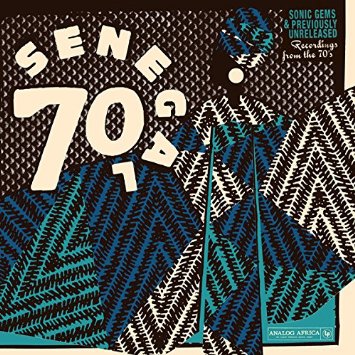Few sounds capture tropical heat-induced laziness better than a full Latin orchestra in a reverie. Unpick those sounds, and each member of the orchestra is essential to a groove that lasts as long as it takes for ice to melt in a rum cocktail. Horns are sultry, drums are earthy, guitars ebb and swell in slow rhythms and the bass is thumped out in a simple yet weirdly penetrating assault. Forget sweating it out in an afrobeat gig. When the music is this well acclimatised, you either crash sprawled in a chair or, if you and your partner can muster the energy, plug directly into the rhythm by swaying to a slow dance.
So in a place as humid and sweat drenched as a Dakar night club, it’s no wonder how popular the Cuban ensembles who toured Senegal in the 1940s became. They arrived alongside Cuban sailors and merchant traders, who exported goods from the West African coast from Senegal to Liberia. For the numerous Afro-Cubans on these voyages, there must’ve had a sense of homecoming; Dakar’s music scene had found a niche, and so a Latin echo travelled several decades on without losing its power.
Senegal 70, a hotly anticipated offering in partnership with two of the biggest names in African re-releases – Analog Africa and Teranga Beat – puts a spotlight on Dakar in an age when international stars like James Brown, the Jackson Five and Cuban singer Celia Cruz were travelling to West Africa’s new creative hub. The organ rich, reggae-swaggering opener, ‘Mariama’, is a fantastic display of how everything congealed into one huge punch. Play a few opening seconds of any track here and not a lot changes, but this only adds to Senegal 70‘s hypnotic force; underlying Latin influences again gave Senegal a slower, groovier music scene than its oft referenced Nigerian counterpart. And while King N’gom’s ‘Viva Marvillas’ sounds straight off the streets of Havana, most of this compilation has a distinctly free feel.
Le Star Band de Dakar make one appearance with ‘El Carretero’, a track which flaunts their intoxicating way of mixing Afro-Cuban rhythms and Wolof language lyrics. Led here by the illusive Guinean singer Amara Touré, the band became a workshop that extracted the African roots of Cuban genres like Son Montuno and Patchanga with enormous popularity. By 1970 le Star Band were in their twilight and an offshoot of younger musicians, the Orchestre Baobab, had become Dakar’s premier group. Unusually credited on two slick tracks here as ‘Bawobab’, the group became locally famous for updating the Star Band’s sound with wild horn sections and Santana-worthy guitar riffs.
Other standout tracks include ‘Kokoriko’, which is effortlessly made danceable by assorted cutlery percussion. Vocals are in fashionably Americanised English, with the occasional "funky… urggg!" grunt chucked in for good measure. More revolutionarily, Le Tropical Jazz’s ‘Kiko Medina’ is a stunning cry of expression through music without boundaries. The drums are frantic, and even the guitar takes on a percussive quality by rumbling along in a low growl. For anyone keen to experience Afro-Cuban music in its least cosmetic, most explosive state, Senegal 70 is a must-have.
<div class="fb-comments" data-href="http://thequietus.com/articles/19342-senegal-70-sonic-gems-previously-unreleased-recordings-from-the-70s-review” data-width="550">


